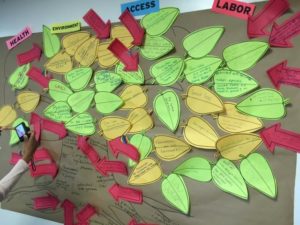
by Deva Jones | Oct 30, 2015 | Economic Justice
This post was written by Hannah Hafter, Senior Associate for Service-Learning Programs at the UU College of Social Justice (UUCSJ).
 Did you know that over 30 million people in the U.S. alone are employed in the food chain, making it one of the largest sectors for employment in the country? Yet food chain workers are among the lowest paid and most highly exploited groups—from farm workers who are excluded from the Fair Labor Standards Act to servers at restaurants who legally earn a minimum wage of only $2.13 an hour plus tips. We are all participants in this food chain as consumers, whether we eat out or at home, and as consumers, we have power to stand with those exploited in the workplace.
Did you know that over 30 million people in the U.S. alone are employed in the food chain, making it one of the largest sectors for employment in the country? Yet food chain workers are among the lowest paid and most highly exploited groups—from farm workers who are excluded from the Fair Labor Standards Act to servers at restaurants who legally earn a minimum wage of only $2.13 an hour plus tips. We are all participants in this food chain as consumers, whether we eat out or at home, and as consumers, we have power to stand with those exploited in the workplace.
For these reasons, the UU College of Social Justice (UUCSJ) collaborated with the Food Chain Workers Alliance in September to host the first Justice in the Food Chain training. This Chicago event brought together members of three mid-west Workers Centers (working in agriculture, slaughterhouses, and warehouses), Unitarian Universalists, and other faith-based allies to learn about the root causes of problems in the food chain and to collaborate on campaigns to improve them.
Together, food chain workers and faith-based allies shared stories, built community, and learned concrete organizing skills for analyzing power and running effective campaigns. The training’s goal was to empower participants to work towards “Good Food Purchasing Policies” (GFPP) in their cities, school systems, and other institutions. Good Food Purchasing Policies like the one already implemented in Los Angeles create standards for millions of dollars of food purchases addressing the four areas of: Heath; Environment; Access; and Labor (HEAL). Good Food Purchasing Policy campaigns also create collaborations across sectors, bringing together groups working on making healthy food more accessible with people working to improve labor standards in the food chain.
Our 25 participants went home with plans for how to build campaigns in their mid-west communities. Keep an eye out for future Justice in the Food Chain trainings taking place locally in your region. To learn more about Worker Justice Centers and find out what is happening where you live, go to this list of Food Chain Workers Alliance Member Organizations.
Thank you to the Food Chain Workers Alliance, Labor Notes, the Northwest Arkansas Worker Justice Center, the Rural Community Workers Alliance, and the Cincinnati Interfaith Workers Center for collaborating with us! And thank you to all of our participants, and particularly to the Unitarian Church of Evanston which had the largest contingent.

by Deva Jones | Oct 10, 2014 | Economic Justice, Internship, Young Adult
This post was written by Renee Bryant, a participant in the Global Justice Summer Internships.
Working with Jose Oliva this summer at the Food Chain Worker’s Alliance (FCWA) allowed me the opportunity to reflect on my previous experience as a black woman in the food industry and study more about food justice overall. Jose is a Latino male and has worked in the food industry in the past. His experience is what drives him and gives him a passion to highlight the injustice, specifically in the form of pay that workers in the food industry receive. Women and racial minorities are consistently at the bottom of the totem pole when it comes to food industry justice because they are often in positions where they can be taken advantage of due to the hierarchies and systems our society sustains to keep those groups at the bottom. From working with Jose, I learned that these people often cannot afford an education and are stuck working dead-end food jobs where they get paid little and work long hours. Over time it becomes a cycle and these people get stuck in sometimes multiple food jobs struggling to make ends meet while the companies they work for make billions.
I could identify with the little pay and exhausting work due to my experience working at McDonald’s one summer. The summer after my freshman year of college I had not gotten any internship offers so I took a job at my local McDonald’s as an overnight crew-member. I do not come from a privileged background and I needed money for books and other expenses since Vassar is not exactly a cheap school. I worked four or five nights a week and made $7.25 an hour. My duties included cleaning the restaurant, taking orders, cashier, and stock for the next day. By the time 6 a.m. rolled around my feet would be sore, I was annoyed from being sexually harassed by customers and coworkers all night, and sad I was missing the summer fun all my friends were having. When I would turn in my drawer, I would notice how much money the restaurant was making and compared that to how little I was receiving in my paycheck.
Fortunately for me, the job was only temporary and I was able to return to school and move on. Some of my coworkers did not have the privilege of a short experience and for them McDonald’s was their sole income. I could not imagine trying to raise a family or live on my own on the wages a McDonald’s salary provides because the money I made during the summer barely covered the cost for my books and incidentals for the first semester. In some ways feel like there is some disconnect from me and the other employees despite the fact that I am a woman of color and a lot of my coworkers fit into that demographic. I at least had the luxury of moving on to work on my education while others could not even afford community college. Pairing my experience at McDonald’s and my experience at FCWA has shown me that everyone deserves to get paid a fare wage whether they are only a college kid making summer money or a single mom with a teenage son. The lesson I learned this summer at FCWA was that every job and every worker is worth more than companies are willing to admit.

by Heather Vickery | Sep 23, 2013 | Economic Justice
The following post was written by Evan Seitz, Senior Associate for Service-Learning Programs at the UU College of Social Justice (UUCSJ).
How did you honor workers this Labor Day? For seven UUs, the answer was to attend a rally with labor leaders at the historic Pullman Factory in Pullman, Illinois. That’s not all the group did. They visited the site of the Hay Market Affair, which inspired May Day celebrations worldwide; met with labor organizers working in the restaurant industry and warehouse industry; and strategized on ways the UU community could more effectively ally with the labor movement. The activities were part of the inaugural “Food for Thought Program,” an economic justice training program offered by the UU College of Social Justice and UU Service Committee partner the Restaurant Opportunity Center (ROC).
The training offered a chance to really listen to the people working to change entire industries. We heard from Felipe Tendick-Matezans, an organizer for ROC-Chicago who for many years worked in the restaurant industry. According to Felipe, it isn’t unusual for a worker to toil for years in the same position, with no opportunities to advance. ROC has changed that by offering certificate programs in bartending and other skills. The real work of ROC though is in organizing workers to participate in campaigns. Wage theft, paid sick days, better working conditions – all of these are tackled by ROC, which is structured as a series of local city chapters known as affiliates or smaller “ROC-Star” groups.
ROC and UUSC have collaborated on the Choose Compassionate Consumption campaign, which seeks to mobilize UUs as consumers to advocate for workers’ rights. As part of the training, our group dined at “High Road” restaurants – restaurants whose owners have pledged to pay their workers a fair wage and work to improve benefit packages and opportunities for advancement. Not only did we thank the staff for their service, we thanked the management and let them know we were eating there because of their fair labor policies.
I came away from the Food for Thought training having a much better understanding of how I could support this movement for fair wages and working conditions in the industry. If you care about the workers who prepare your food and want to gain the skills and knowledge to be a leader on this issue, consider coming to our next training on April 29 – May 3 in Chicago.

 Did you know that over 30 million people in the U.S. alone are employed in the food chain, making it one of the largest sectors for employment in the country? Yet food chain workers are among the lowest paid and most highly exploited groups—from farm workers who are excluded from the Fair Labor Standards Act to servers at restaurants who legally earn a minimum wage of only $2.13 an hour plus tips. We are all participants in this food chain as consumers, whether we eat out or at home, and as consumers, we have power to stand with those exploited in the workplace.
Did you know that over 30 million people in the U.S. alone are employed in the food chain, making it one of the largest sectors for employment in the country? Yet food chain workers are among the lowest paid and most highly exploited groups—from farm workers who are excluded from the Fair Labor Standards Act to servers at restaurants who legally earn a minimum wage of only $2.13 an hour plus tips. We are all participants in this food chain as consumers, whether we eat out or at home, and as consumers, we have power to stand with those exploited in the workplace.

